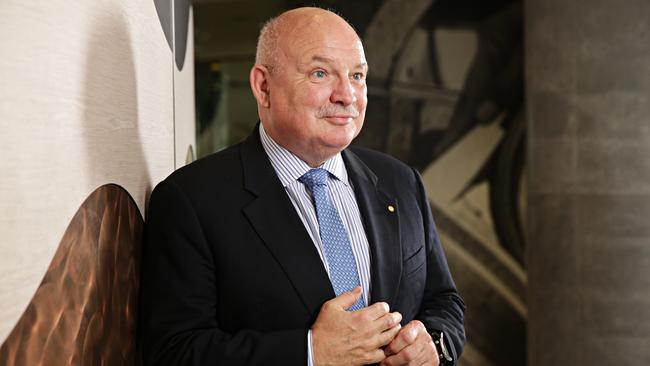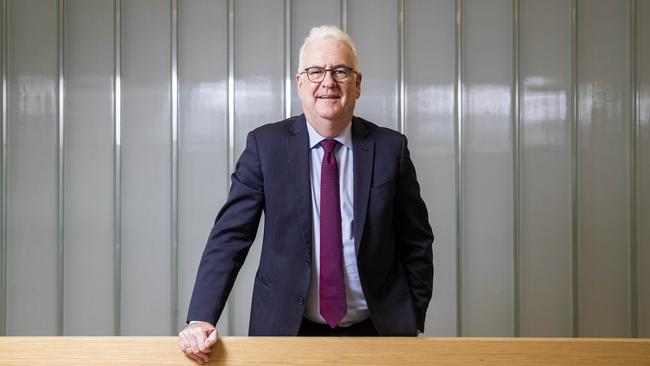AGL spin-off could go private as ESG pressure mounts
For Peter Botten, the former longtime chief of oil and gas company Oil Search, the AGL demerger is driven by a double whammy of pressure.

The much anticipated split of giant gentailer AGL into Good co/Bad co in the eyes of the increasingly climate-conscious investment community is the start of a long haul for AGL chairman Peter Botten and interim chief executive Graeme Hunt. It may even be the trigger for AGL’s coal-fired generation business, the largest Co2 emitter in the country, to move into private hands. Frankly, it raises questions about the fate of other ESG-unfriendly businesses, from fossil fuels to Endeavour, the drinks business recently spun out from Woolworths.
For Peter Botten, the former longtime chief of oil and gas company Oil Search, the demerger is driven by a double whammy of pressure.
“Few people if any predicted the pace with which renewables would change the market on the east coast. Together with the really strong influence of financiers and investors, the inflection point of what the energy make-up for the east coast of Australia is going to be is changing.
“We’ve got a dramatic challenge,” he says.
“We as a major coal-fired generator representing about 70 per cent of the market in the east coast have to lean into that change and address how AGL can preserve and then add value to shareholders over the next 10 years.”
The 10 per cent fall in AGL’s share price last week and sobering broker reports on the demerger announcement are unedifying for the blue chip. Founded in Sydney in 1837, The Australian Gas Light Company was the second company to list on the Sydney Stock Exchange.
After the split, the new AGL Australia will take the retail and renewables businesses.
Accel Energy will house AGL’s coal-fired generation and wind farm assets.
Botten and Hunt will become chair and CEO of Accel. As a CLSA report notes, the business will remain the largest corporate emitter of CO2 in the country, even after the closure of Liddell.
Coal-fired power in Australia is on borrowed time with closure dates at risk of being brought forward. Their plan is to transition the power station land into new energy hubs for batteries, renewable power and other business.
To their credit, assuming shareholder approval, Botten and Hunt will have delivered two investment-grade businesses with bank financing, including $800m funding for Accel Energy secured from domestic and international banks.
As part of the deal Accel will own 15-20 per cent of AGL Australia, a stake worth perhaps $400m. Graeme Hunt insists that the holding was not a condition of financing. Accel energy will be the mothership with AGL Australia spun out.
“It’s quite often the case that the mother retains some shareholding in the child,” he says.
“The banks looked at the whole of asset base of Accel and its future earnings but it’s wrong to characterise, as some have, that it was conditional. It will get flexibility, it will allow Accel to enjoy any uplift in value in AGL Australia as it grows and we thought that was appropriate.”
Most analysts agree the holding (with no board seat) is financially critical. Mark Samter at MST Marquee sees it as “strong evidence that it is an entity that struggles to stand on its own two feet”.
JPMorgan notes: “It does imply that Accel will not likely be able to sell its stake in AGL Australia.”

The 10 per cent hit to the AGL share price last week was in part due to lower guidance with wholesale energy prices affecting generator margins. But it was also the dividend outlook.
The market had expected AGL would need to raise equity. Instead, there is to be a cut in the special dividend and an underwritten dividend reinvestment plan, together valued at over $400m. Analyst JPMorgan says management appears to have avoided a large capital raising.
“I suppose DRPs can be seen to be some form of capital raising as part of a process,” says Peter Botten. “The board was very, very mindful that it wanted to set up both Accel Energy and AGL Australia with the right balance sheet capacity to be able to run its business effectively as well as growth.”
Post-demerger, the five-year path for the two businesses will be very different, with changes in share registers. Peter Botten believes AGL Australia has a very bright future.
“An outstanding entity which produces electricity, manages its gas portfolio and is a driver for renewables as well as being very customer-focused. It will have access to different financing, technologies and have a different multiple being applied to it.”
In five years, he says, Accel Energy will still be producing electricity from coal, helping stabilise the grid but increasingly working with government, regulators and communities to shift away from fossil fuel.
“For those that get the transition story, Accel Energy will be heavily leveraged to the wholesale electricity price and so as prices move around it will generate a lot of cash,” says Hunt.
Debt will be amortised efficiently and high-cost legacy wind contracts will run down, leaving Accel well-positioned to reinvest or pay dividends, he argues.
The development of energy hubs has both upside and risk for Accel. “It has tremendous real estate value,” Botten says.
“Excellent places to build a new business, build different technologies, partner with different groups and have a growth strategy utilising our existing workforce, retrained to be able to drive a different business.” Hunt, meanwhile, says debt and equity players are showing interest in investing directly in hubs, not necessarily through Accel but other vehicles where Accel might hold equity. “You have the network connectivity right there for business, so the cost of connecting is minimal.”
The risk comes with timing, given that Accel Energy faces remediation costs as generators close. New business at the hubs could delay remediation but there are restructuring costs. And the whole time frame risks being squeezed if generators are forced to shut earlier.
All the while ESG pressure is rising. It is a market where at least some public companies will end up in private hands.
“This is a transition not just in the energy market but also the investment community (attitude) towards the energy market,” says Peter Botten. “I do believe that a number of these assets are potentially best held in private hands.
“Whether we like it or not, the pressure of the investment community on a public listed company drives the behaviour and does potentially shackle investments which are essential to provide what is an essential service.
“Private equity will play a significant future role in owning and operating energy utilities. From an AGL perspective, it all comes down to price and value and what is in the best interest for the current owners.”
At the clean green business AGL Australia, two women have been put in charge – a quirk not lost on the media at the demerger briefing. AGL’s chief customer officer Christine Corbett will be chief executive and current AGL board member Patricia McKenzie will be chair.
“Christine has got enormous depth of knowledge on the customer side in AGL Australia and Patricia has got deep and very significant experience on the energy side,” Botten says. “Fantastic for a diversity story that the leaders are both women and I think will do an outstanding job.”
The men get the hairy business of Accel Energy, one of the great challenges of their lives, says Botten. “This is going to be a tough road to hoe. It has really intricate and deep relationships with regulators and governments and working through the finance areas, the heavy project operations and of course managing the transition of ESG. All of that requires some experience of dealing with government, dealing with complex stakeholder relations and management. I think our experience will be useful.”
Putting aside the abrupt departure of former CEO Brett Redman, governance has been a question in the demerger. MST Marquee’s Mark Samter, who clearly respects Peter Botten, supports the demerger but argues it should have been executed far earlier, noting: “It is just unfathomable that three of the four major positions announced were filled by people who sat on a board that 53 weeks ago was finishing a $630m buyback and now is having to scrap the dividend and deal with a 60 per cent-plus lower share price.”
Peter Botten says that after an extensive CEO search the strongest candidates got the jobs. And the two boards will be built out with some existing AGL board members and new blood.
There is a lot for the market to digest and many unknowns. AGL has a formidable trading business. Those skills will now be split with the expectation that COO Marcus Brokoff will go to Accel. Then there is the shared cost of the demerger. The Woolworths Endeavour demerger, arguably much simpler, cost $280m. The colouring in will have to wait for August results.





To join the conversation, please log in. Don't have an account? Register
Join the conversation, you are commenting as Logout